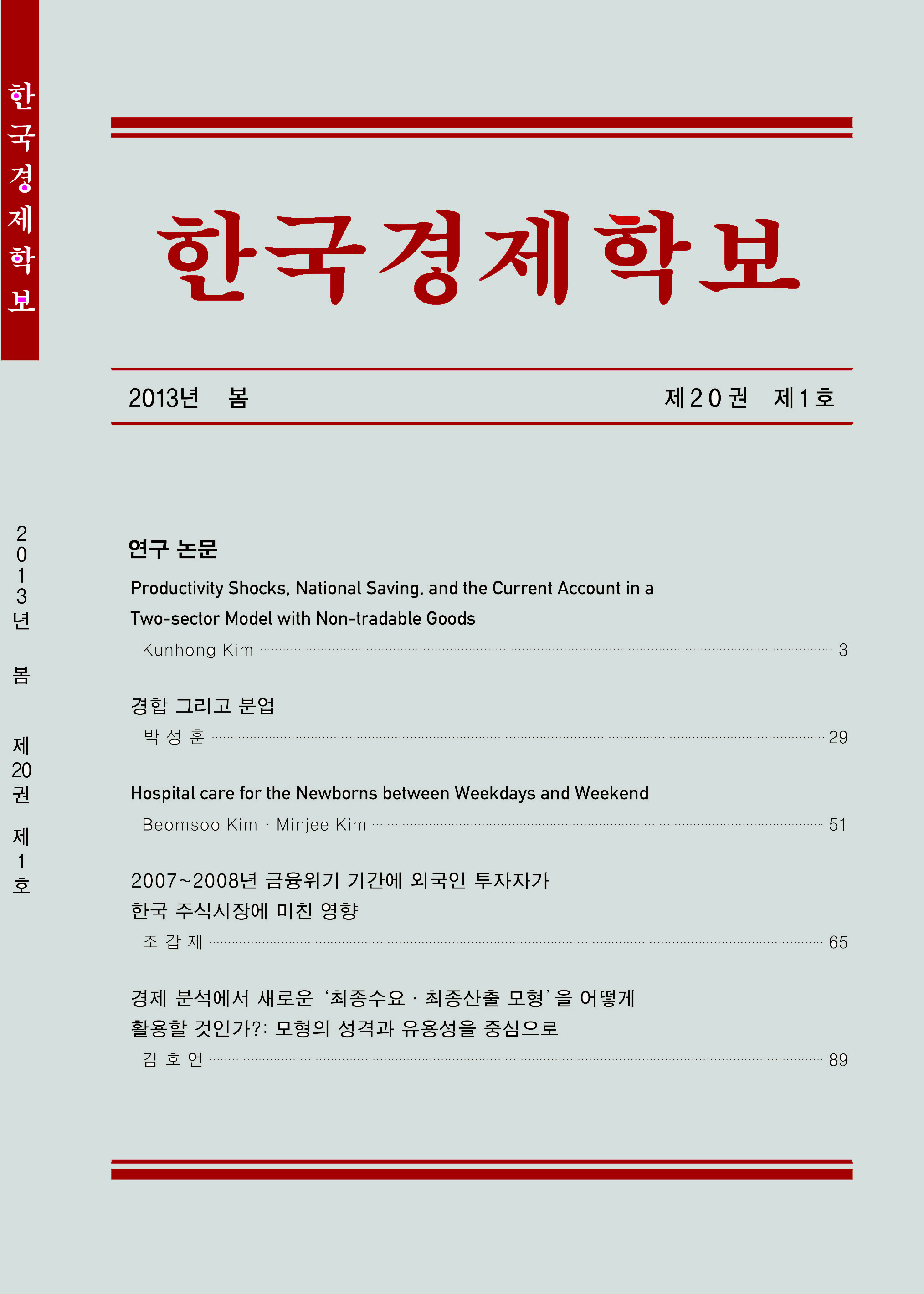
한국경제학보 제 25권, 제 2호 (2018년 가을)
Chulyoung Kim, S. David Kim, and Sangyoon Nam
Pages 61-84
-
Abstract ( Eng | Kor ) || PDF
- Strict Liability, Settlement, and Moral Concern
Chulyoung Kim, S. David Kim, and Sangyoon Nam
We investigate the consequences of introducing a settlement stage
to the environment of Deffains and Fluet (2013) in which an
injurer has moral concern about harming a victim. Focusing on
the unique interior solution, we characterize the Perfect Bayesian
Equilibrium that has a cutoff property: high-moral types are
willing to settle whereas low-moral types reject the victim’s
settlement offer and proceed to trial. We show that the injurer’s
equilibrium level of precautionary effort increases as the injurer’s
moral type increases and becomes constant at the marginal
moral-type who is indifferent between settlement and trial. We
also discuss the settlement’s effect in reducing the high types’
precautionary effort.
- 본 논문은 Deffains와 Fluet (2013)의 모형을 확장하여 합의 단계를 도입하고,
그에 따른 결과를 분석한다. 우리는 유일한 내부해에 주목하여 컷오프(cutoff)를 가지는 완전베이즈균형을 도출하였다. 즉, 높은 도덕성을 보이는 유형일수록 합의하기를 원하지만,
낮은 도덕성을 보이는 유형은 피해자의
합의 제안을 거절하고 재판으로 가길 바란다. 우리는 가해자의 도덕성이 높을수록 가해자의 균형에서의 예방적 노력 수준이 증가한다는 것을 보이고, 나아가 합의하는 것과 재판으로 가는 것이 무차별한 도덕성 유형은 일정한 수준의
예방적 노력을 기울이는 것을 확인한다. 또한 합의 단계가 높은 도덕성 유형의 예방적 노력을 감소시킨다는 사실을 보인다.
성병묵, 이경우, 김광환
Pages 85-118
-
Abstract ( Eng | Kor ) || PDF
- Intergenerational Redistribution and Monetary
Policy with Asset Bubbles
Byeong Mook Sung, Kyung-woo Lee, and Kwang Hwan Kim
This paper analyzes the optimal policy mix when asset bubbles
exist in an overlapping-generations model with nominal rigidity.
Government redistributes income across generations through an
asset tax and transfer payments, and the central bank adjusts the
interest rate in response to asset prices. We find that if both the
government and the central bank minimize the volatility of bubble
assets’ prices, the interest rate should move one-for-one with
bubble prices, but in opposite directions, whereas the
redistribution policy depends on the source of the bubble price
volatility. However, when the government minimizes the welfare
loss due to consumption volatility, it reduces the consumption gap
between the young and the old through the redistribution policy.
Finally, if both policy makers minimize the welfare loss, the
monetary policy should take into account both direct and indirect
effects of the bubble price volatility. Moreover, the redistribution
policy should consider the generational consumption gap in
addition to those effects.
- 본고에서는 가격경직성이 있는 중첩세대 모형에 자산 버블이 존재할 경우
최적 정책에 대해 분석한다. 정부는 자산세와 이전지출을 통해 소득을 세대 간에 재분배하고 중앙은행은 자산가격에 반응하여 금리를 조정한다.
먼저 정부와 중앙은행이 모두 버블자산 가격의 변동성을 최소화할 경우, 금리는 재분배 정책과 상관없이 버블자산 가격이 상승한 만큼 인하되고,
재분배 정책은 버블자산 가격 변동성의 원천에 따라 결정된다. 반면에 정부는
소비 변동성으로 인한 후생손실을 최소화할 경우, 노년층에 다소 유리한
재분배 정책을 통해 청년층과 노년층의 소비 격차를 줄인다. 마지막으로
정부와 중앙은행이 모두 후생손실을 최소화할 경우, 통화정책은 버블자산
가격 변동성의 직간접 효과를 모두 고려해야 하고, 재분배 정책은 그에
더하여 세대 간 소비 격차까지 고려해야 한다.
이병채
Pages 119-136
-
Abstract ( Eng | Kor ) || PDF
- Immigration Incentive in the Local Public Good Economy
Byungchae Rhee
It is frequently observed that there is considerable difference
between local communities. The previous literature has been
focusing on the immigration incentive of an individual using the
so-called “voting-with-feet” model, in which each community is
exogenously given a certain level of local public goods. Adopting
the optimal feasible taxation model in Rhee (2008, 2012), we
analyse the immigration incentive of an individual whose wealth
characteristics are observable. The analysis shows that each
individual always wants to form a community with another
individual who is more likely to be rich. This incentive may
aggravate segregation between local communities.
- 지방자치제가 도입된 이후 지역 간 격차가 발생하고 있다. 주민들은 자신
에게 가장 큰 효용을 가져다주는 지역으로 이주할 유인이 증가하고 있는것이다.
기존 연구들은 지역 선택 또는 이주의 문제를 지역공공재 공급 수준이 주어진 경우,
발로 하는 투표(voting with feet)로 모형화하는 외생적 접근이 주를 이룬다.
본 논문은 Rhee(2008, 2012)에서 소개된 적합한 최적조세 모형(Optimal Feasible Taxation)을 이용하여 한
주민의 내생적 이주 유인을 간단한 모형을 통해 살펴본다. 분석 결과,
소득에 대한 외형적 특징을 관찰할 수 있는 경우 이주 유인은 지역 간 쏠림현상을
가져와 지역 간 격차를 심화시킨다.
The Korean Journal of Economics, Vol. 25, No. 2 (Fall 2018)


